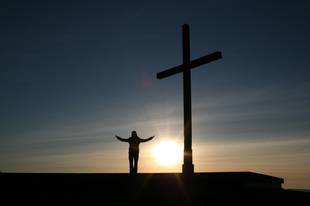
Considering that there are many different religions in the world, and that each religion teaches beliefs that conflict with those of other faiths, and in spite of the uncertainty in the beliefs, why do many people hold their religious beliefs with fierce determination and intense tenacity?
There are countless reasons for this, such as the following:
- Religious beliefs are a major, integral component of how people view themselves. Often, one’s faith is tied to one’s nationality, culture, and race, even sexual orientation.
- People believe that their religion links them directly to God and/or other deities.
- Religion permeates all aspects of one’s life. It provides rituals for life’s major transitions like birth, coming of age, marriage, puberty, pregnancy, menopause, death, etc.
- It teaches rewards beyond one’s ability to imagine which are associated with salvation, horrendous eternal punishments for the unsaved, and the mechanism(s) by which people become saved.
- It is often the source of one’s moral codes. It delineates God’s expectations for the behaviour of each believer.
- It provides an understanding of the universe. It teaches what believers can expect after death; it explains the origin of the world’s life forms; the earth itself, and the rest of the universe.
- The religious community gives unquestioning belief in their own faith group's teachings.
In his book, Philosophy, An Introduction, Prof. Amable Tuibeo has the following insights in the persistence of religious thru the ages;
"It appears that religion has had a natural history of evolution arising, as it did, from man's primeval "fear of the unknown" which was translated later on into beliefs in ghosts, spirits, gods and God, religion has survived to this day. Why it has become so pervasive and widespread, despite its crude beginnings, is a question which has not ceased to baffle the inquiring minds of philosophers. Could it be that religion has something to offer, or could it be that man always need some "illusion" with which to make poetical the hard prose and dull routine of human existence? Could it be a convenient tool for rationalizing social inequality in the hands of those whose economic and political power are entrenched in the status quo? Could it be that the so-called "God of Peace" is often involved to pacify social unrest and to thereby anatomize libertarian struggle for radical change?"
Related Social Concepts on Religion
1. Folk-Catholicism. It refers to indigenous practices and old beliefs of the people which are interwoven into the Catholic official practices. Example: beliefs in "encantados" (spirits and widespread use of "anting-anting, amulets and talismans.")
2. Split-level Christianity. It refers to a situation where there is a coexistence within the same person of two or more thought-and-behavior systems which are inconsistent with each other. (Fr. Bulatao, 1966) e.g., Catholics who commit graft and corruption and attend Mass every Sunday.
3. Faith healing. It refers to indigenous practice of faith healers who serve as mediums for healing energy. This is done by invoking divine power through empathy and reliance on the faith of the patient (Panopio, 1985)
4. Occult. It is derived from the Latin word "occultus", which means mysterious practices related to supernatural forces beyond the five senses. Included versions are practices and beliefs in astrology, magic, witchcraft, numerology, crystal ball gazing, spiritism, and fortune telling. (Villafuerte, 1992).
5. Invisible or Private Religion. It refers to the practice of many people who are critical of organized religion, or who disclaim any religious affiliations to focus on certain ultimate themes and private experiences such as on intimacy, work, or peace of mind rather than on the issues central to traditional religion (Thomas Luckmann, 1967).
6. Fundamentalist Revival. It refers to the religious practice of the many people who retrieve the powerful spirit of traditional religion but adapting it to modern life. It stresses evangelization and piety, absolute authority of the Bible, personal conversion and salvation.
7. Electronic Church. It refers to that form of religious expression using religious radio and television programs that reinforce traditional religious beliefs and ultimate themes of private religions, such as autonomy, self-realization, and essence of family. Among the stars of the "electronic church" in the U.S are Jimmy Lee Swaggart, Oral Roberts, Res Humbard, Robert Schuller, Jerry Falwell, Jim Bakker, and Pat Robertson. In the Philippines, we can mention Bro. Mike Velarde of El Shaddai, Brother Eddie Villanueva of Jesus Is Lord, and Ely Soriano of Dating Daan.


















